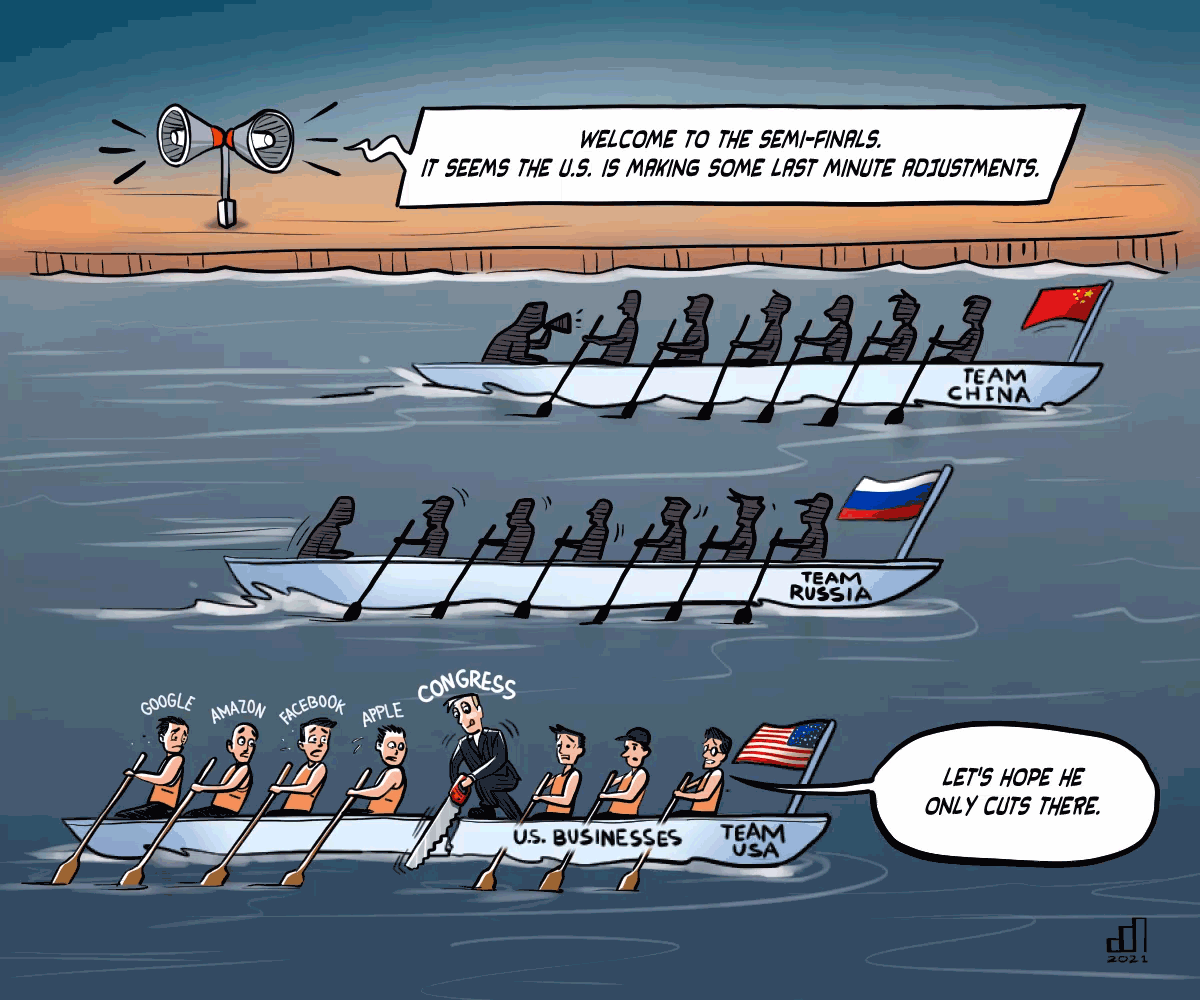Tech Regulatory Overhaul Series: A Discrimination Bill Against Consumers

The fifth blog post in DisCo’s series analyzing the tech regulatory package introduced in the House focuses on the most concerning bill included in the legislative proposal, the American Choice and Innovation Online Act introduced by Representative Cicilline. This bill is known as the ‘Non Discrimination Bill’ but could be well referred to as the ‘Discrimination Bill’, the ‘Break-up Bill’ or the ‘Free Ride Bill’. As explained further in this post, this bill will have many negative effects and won’t promote consumer choice; in fact, it is fair to say that this bill is an example of what can be called ‘regulatory hypocrisy’. If adopted, Representative Cicilline’s bill will not only prevent consumers from enjoying online services they like, limit their choices, and mandate companies to be broken into separate small businesses, but will also force opening up some digital services to competitors, including Chinese competitors that will take this opportunity to free ride on U.S. investments.
Traditionally, U.S. antitrust norms promote economic welfare to the benefit of consumers. That is, the U.S. antitrust norms rely on the understanding that the competitive process will yield the best results for consumers in the form of lower prices, increased output, and improved and innovative products and services. Antitrust authorities, by enforcing the antitrust norms, ensure that no anticompetitive conduct takes place in the so-called relevant market, so that the market economy formula works best for consumers. In turn, consumers benefit and innovation flourishes, which ultimately improves the competitiveness of the U.S. economy. Representative Cicilline’s bill does just the opposite of what antitrust enforcement seeks.
It’s a ‘Discrimination Bill’:
The bill is discriminatory in nature because it includes a list of prohibitions and obligations that will be applicable to only a handful of companies leading the digital economy, the so-called ‘GAFAM’ or Google, Amazon, Facebook, Apple, and Microsoft. The scope of application of this bill distorts the competitive process and proposes that the U.S. government engage in industrial organization by selecting who can do what in the digital space. Ironically, it does so under the excuse of an artificial ‘non discrimination’ principle. As such, the bill proposes to ban ‘GAFAM’ companies from running their businesses as any other company would, and prevent them from being consumer-centric. By imposing prohibitions on activities such as bundling or self-preferencing, or imposing obligations like granting access to data and interfaces, or discriminating against private label brands, consumers will be deeply hurt. The following are some examples.
1. The end of Prime Day as we know it. Today may be the last Prime Day where consumers can enjoy discounted prices on a variety of goods and services if the bill is passed. According to this bill, selling products and services at cheaper prices should be regulated if the company not only sells its own products, but also sells the products of third party sellers. Indeed, Amazon Prime as a service may end altogether. The solution that this bill seems to propose appears to be to force the company not to sell both its own private label products together with the products of other companies, so consumers will have a more limited selection of products to acquire. Thus, the bill could end services that consumers enjoy like same day or next day delivery.
2. The end of Game Pass on your Xbox. As many Xbox players know, Xbox Game Pass is a video game subscription service that Microsoft offers through its store for use with the Xbox consoles, Windows 10 machines, and Android devices. Thanks to this service, many gamers enjoy an ever shifting range of high quality games to choose from at an extremely discounted price. But according to the bill, this offering to consumers most likely will be banned.
3. The end of Google Maps displays next to your Google searches. Consumers, without question, enjoy the ability to search Google for a physical place (such as a restaurant) and not only get the search result in the form of links, but also a Google Maps display that provides directions. According to the bill, showing a map with the location of a search may be prohibited if that map is a service offered by the same company who owns the search engine.
4. The end of Stories on Facebook as we know it. As Instagram users know, Facebook allows users to post their Instagram stories on Facebook. As a result, users make a more efficient use of their time as they do not have to reproduce content on multiple sites, but actually promote the same content instantly. According to the bill, however, this capability may have to change, as Facebook could be banned from offering this efficient use of its services to its users as it would be classified as a self-preferencing practice.
These are only a few examples of how consumers will be hurt with the implementation of this bill, but the concerns go far beyond these immediate negative effects. This bill fails to understand the innovation dynamics that characterize the digital economy and the importance of promoting successful business models. As such, it not only distorts the digital services space, but also imposes restrictions on the digitization of the economy as it creates negative incentives for traditional businesses to transform themselves into consumer-centric multi-sided business models. In the end, this bill throws consumers’ interests out of the window and instead focuses upon what antitrust frameworks do not seek to pursue, i.e. protect competitors rather than the competitive process.
It’s a ‘Break-up Bill’:
The text of the bill as introduced for mark-up includes a ‘conflict of interest’ provision that renders the entire bill futile given the discriminatory nature of its scope of application because it will demand a break up of ‘GAFAM’ before even applying such a list of obligations and prohibitions. As previously mentioned, the bill includes a list of obligations and prohibitions applicable to ‘GAFAM’ companies. However, in parallel, the bill suggests that structural separation should be mandated if the nature of the business model is not compatible with the enforcement of the discriminatory obligations and prohibitions because the company relies on running multiple lines of businesses and therefore conflict of interests exist. As a result, the list of prohibitions and obligations included in this bill are useless, because the bill will mandate digital service providers’ business models to be broken.
Indeed, in practice, the ‘conflict of interest’ provision means that the application of the list of discriminatory prohibitions and obligations will be the exception, and breaking up leading tech companies will be the norm.
As it is well known, digital services providers’ most common business models consist of integrated services and products that are offered to consumers for their benefit. In other words, the companies affected by this bill all have conflicts of interests when running their businesses according to the text of the bill, and as such should be broken into different companies.
Structural separation is not new to the U.S. legal system. In fact, the U.S. antitrust system foresees the possibility of imposing structural separation to remedy an anticompetitive conduct if harm to consumers is proven and such a remedy is the only alternative to fix the markets. But the ‘conflict of interest’ provision included in this bill is not akin to the structural separation remedial action available under antitrust laws. In fact, forcing leading tech companies to be broken into separate businesses will only harm consumers, and discriminate against U.S. competitiveness in favor of other jurisdictions.
In a world where the robustness of the tech industry is paramount to national security from a geopolitical perspective, introducing a bill that will run against the U.S. national interests is shortsighted. An analysis from a Realpolitik perspective informs that a nation with mini– Googles, Amazons, Facebooks, Apples and Microsofts won’t be sufficiently powerful to compete against mega-Tencent, Alibaba, Xiaomi, Baidu, and TikTok. As a result, not only will consumers be deprived from the benefits that integrated business models can offer, but the bill will grant market power to bigger foreign players that eventually will be able to offer better services and gain market power outside of their home countries.
It’s a ‘Free Ride Bill’:
Finally, the bill appears designed to transform ‘GAFAM’ companies into common carriers and impose on them obligations to deal with any other user or competitor that requests to do so. This is provided the conflict of interest clause is not preemptively applied first.
‘GAFAM’ companies are some of the most R&D intensive companies that exist across the economy. As a result, ‘GAFAM’ has introduced novel products and services that have transformed our societies. Can anybody imagine this pandemic without free connectivity services? But this bill fails to acknowledge that innovative solutions have been introduced thanks to the economic incentives that the U.S. has created for risk takers to innovate.
In fact, the bill runs against what has made the U.S. the number one place in the world to innovate and invest. Indeed, it is no secret why our digital services are some of the best in the world. But the reality is consistent with the adage, “to whom much is given, much is required.” And this applies for both digital services and for consumers. There is no free lunch, and companies invest in R&D to innovate and seek economic returns. This formula is applicable to any corporation whether it operates online or not. In contrast, policymakers behind this bill seem to want to holistically change the dynamics of the Internet and impose heavy duties on those companies that invest in innovation the most. As a result, becoming a successful digital service provider will automatically transform your business into a not for profit, and you will be forced to share your investments as well as the return of those investments with the rest of the online players.
By shifting online market dynamics and inverting the formula whereby a company invests with the incentive to profit in return, those incentives will be destroyed. Eventually these services won’t keep up with innovation and consumers will be deprived from enjoying the outcomes of the competitive process.
Furthermore, in a digital economy that heavily relies on innovation, the obligations to deal and share technology as included in this bill will give a blank check to competitors, including foreign market players. As such, leading U.S. tech companies will be forced, subject to exorbitant penalties, to distort the markets and subsidize those companies that did not invest in R&D, or were not successful in carrying out business in a manner that would benefit consumers. This bill will essentially change the competition rules in the online services markets, and eliminate the competitive process as we know it for companies operating online, creating negative incentives for those who know how to innovate. Ultimately these companies will cease to innovate.
It’s a ‘Bad for Consumers Bill’:
In sum, Representative Cicilline’s bill and the rest of the proposed legislative package introduced in the House is the response policy makers have crafted to alter the U.S. antitrust system. However, these bills do not remedy anything antitrust related because the bills do not entail any antitrust reform, but rather naked discriminatory regulation. This ‘Non Discrimination’ bill is the most egregious example of why the House shouldn’t be referring to the legislative proposals as the ‘bills reforming the antitrust system’ but rather the ‘bills bypassing the antitrust framework’. This is why the House should be concerned about supporting this legislation to the detriment of the antitrust framework.








